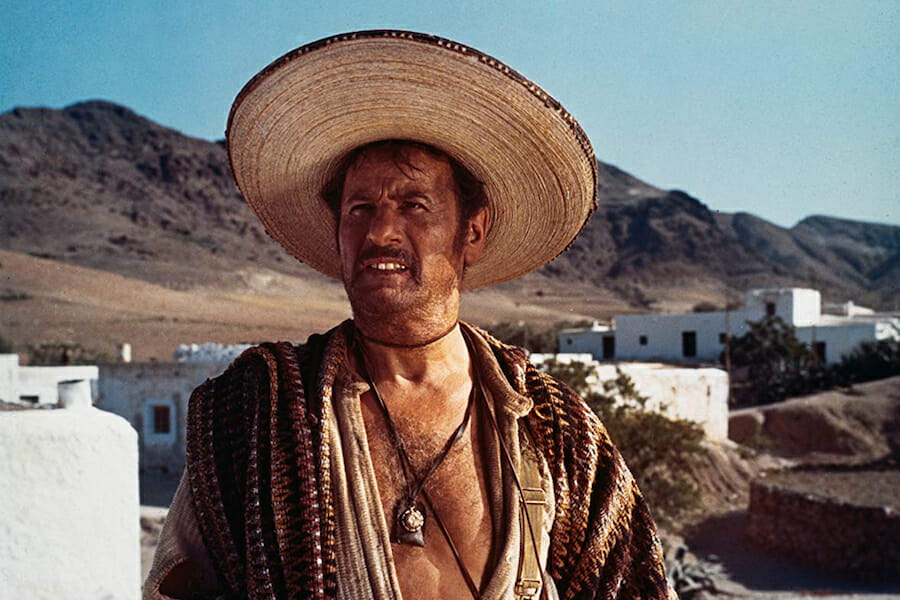
Eli Wallach and Tuco Ramirez
The late actor Eli Wallach enjoyed a glorious career in performance on screen and stage. “He was as wonderful a person as he was an actor,” said Robert De Niro. “He will be missed.” New York Times film critic A.O. Scott, Wallach’s nephew, related: “Eli: 98 years old. WWII vet. Married 66 years. 3 kids 50+ movies. Danced with Marilyn. Raised hell with Clint Eastwood. That’s how it’s done.”
Wallach’s career was punctuated by his iconic turn as Tuco Ramirez in Sergio Leone’s The Good, the Bad, and the Ugly (1966). Had he acted in nothing else, Wallach would have earned a legacy based on this film. Tuco is anything but stereotype. His eyes, his face, his gestures—they blaze with pitiable humanity.
At first glance, Tuco seems the stereotypical “Mexican greaser” bandit. He swindles money from local sheriffs. He swears constantly. His oily face shines in the sun.
He is “the Ugly,” matched against Clint Eastwood’s “Blondie” aka “the Good” aka “The Man with No Name” and Lee Van Cleef’s “Angel Eyes” aka “the Bad.” Tuco is part of the triumvirate of gold seekers that purposes the film.
He is the first of the trio introduced, blasting out of a window with a gun in one hand and a half-eaten chicken leg in his hand, a sliver of meat still sticking out of his teeth.
But Eli Wallach exploits the uniformly strong script to endow Tuco with wit, defiance, and even heart. “I always feel there’s a reason for what the bandit does,” Wallach once said. “I try to make them human. Because deep inside all of us — did you ever swat a fly? That’s murder.”
Tuco has the biggest mouth in the business but his grin is also the widest. He bounces into each scene, full of beans, like an Old West leprechaun. He always seems to be moving. Squirming, kicking, and crawling his way from the noose.
Tuco possesses that rarest of virtues in caricatures—wit. His mind buzzes with homilies, ready to be dispensed after a close call. “There are two kinds of spurs, my friend,” he says to Blondie when he finally gets the jump on him, “Those that come in by the door, [crosses himself] those that come in by the window.” To a would-be assassin coming after his own hide, Tuco advises: “When you have to shoot, shoot, don’t talk.”
He chides Blondie, his partner in crime, with just a hint of angst. They resemble feuding siblings more than true enemies. Tuco wants to see Blondie, whom he calls a “pig,” experience poverty and hardship. He wants a reversal in fortune. It’s hard not to laugh at prattling Tuco as he forces Blondie, at gunpoint, to prepare a noose to hang himself. “Now make sure the rope is tight. It’s got to hold the weight of a pig.”
When Tuco is captured by the Union army and chained to an oafish officer, he escapes with a note of ridicule: “I like big fat men like you. When they fall they make more noise and sometimes they never get up!”
In memoriam, NPR’s Bill Chappell observed that “Even Wallach’s characteristic smirk had range: It was equally perfect for a devious villain or for an underdog who had just beaten the odds.” His laugh had a multitude pitches, too. Sometimes it resembled the Joker’s, sometimes a hyena’s.
Tuco is jester and a survivor. The expert marksman takes a gun to his bathtub. He explains his struggle to climb out of poverty, despite his family, in a scene that defines his character and the emotional arc of the film: “Tuco: [To his brother Pablo] You think you’re better than I am? Where we came from, if one did not want to die of poverty, one became a priest or a bandit! You chose your way, I chose mine. Mine was harder. You talk of our mother and father. You remember when you left to become a priest? I stayed behind! I must have been ten, twelve. I don’t remember which, but I stayed. I tried, but it was no good. Now I am going to tell you something. You became a priest because you were…too much of a coward to do what I do!”
Blondie and Angel Eyes fill the empty place where a soul should be with avarice; Tuco reserves some space, however small, for brotherhood and love. The bandit shares this realization with Blondie: “Even a tramp like me, no matter what happens, I know there’s always a brother who won’t refuse me a bowl of soup.”
Tuco, “the Ugly,” is actually the heartiest character in The Good, the Bad, and the Ugly. He is the outsider in the trio of bandits—the underdog.
Perhaps Sergio Leone intended the title of his film to be satirical. In his telling of the Old West, there are no heroes. His canvas of coin-questing climbers resembles Frank Norris’s McTeague (1899), Jack London’s The Call of the Wild (1903), and John Dos Passos’s U.S.A (1938).
Leone probably knew that audiences raised on romantic Westerns loved to pick out the heel — the mustached bandit tying the damsel to the railroad tracks, grinning until the hero arrived and stuffed him.
The Good, the Bad, and the Ugly destroyed this narrative model. Blondie, ostensibly the hero, is no better a man than Tuco. Angel Eyes is a killing machine. His moniker is a sick joke. Only thieves of differing aptitude populate Leone’s cinematic landscape. And their faces, American and Mexican, are all corrupted by their work.
Wallach has died but Tuco lives onscreen, riding into the West on the promise of gold and a good cigar—a symbol of greed with a grin.
Angel Eyes: Like a little music with your meal, Tuco?
Tuco: Music? Yeah, it’s very good. It’s very good for the digestion.

